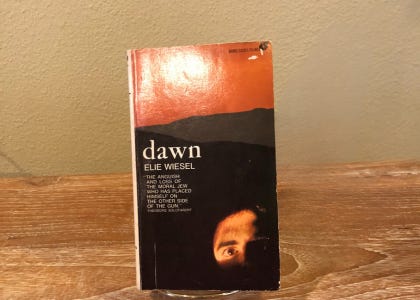Book Review: Dawn by Elie Wiesel
Elisha survives the Nazi war camp and joins the Jewish resistance movement in Palestine. After witnessing the Auschwitz atrocities, will he murder a British prisoner or choose to save his humanity?
Greetings,
Hello, I’m glad you’re here. Recently, I read this book, Dawn, by Elie Wiesel, which was first published in 1960. This is an English translation. Those were printed in 1961.
I found this copy in a flea market. The original price on the cover is $1.65. I think I paid $1.00 for this vintage novel. It’s more like a novella. It’s a small book with only 127 pages. Since it’s not long, I read it in a couple of hours.
I’ve read from this author before. I read Night, a memoir of his Holocaust experience, while I was on a plane to the Caribbean. So when I saw his book for sale, I grabbed it. After reading from cover-to-cover, I later traveled to The Holocaust Memorial Museum in Washington D.C. and saw his picture and a quote from his book, Night.
Elie Wiesel had been the driving force behind the creation of the museum. I’ve visited it twice. Perhaps I should be reviewing Night instead of Dawn. I’ll just tell you right now that Night is a masterpiece. If I hadn’t read it first, I might not have read Dawn. Mr. Wiesel had an immersive writing style, which made me feel as if I was on the journey with him.
About the Author
Eliezer “Elie” Wiesel was a Romanian-born American writer who penned fifty-seven books. His time on this earth spanned from September 30, 1928 to July 2, 2016.
Despite being imprisoned during the Holocaust, he survived and later spent time in a French orphanage. He studied journalism, immigrated to the United States in 1957, and became a naturalized citizen. Once in the U.S., he worked as a professor at several universities.
He wrote books in Yiddish and French, which were translated. His wife translated a lot of them into English. She also was a Holocaust survivor and a writer. They had a son, Shlomo Elisha. I found it interesting that he named his protagonist Elisha in his book, Dawn.
Elie spent much of his life fighting against racism and for human rights. In his eighty-seven years, he achieved more than most. He delivered messages of peace, atonement, and dignity to mankind and was awarded the Nobel Peace Prize in 1986. He left his mark on this world before he succumbed to a long-standing illness.
To learn more about his life, visit these sites Holocaust Encyclopedia, History, The Elie Wiesel Foundation
Book Review
Dawn was a work of fiction, but I saw similarities between the protagonist and the author. They both survived the Holocaust and lived in France.
The story opens with eighteen-year-old Elisha in British-controlled Palestine. A man named Gad recruited him for the Jewish resistance group, which were ridding the English from the region. Their goal was to create a safe haven for the Jewish population.
Early on, I learned Elisha led an apathetic life in France. He gave little thought to his new life as a soldier. The story unfolds, and he’s tasked with executing a British officer in retaliation for hanging a fellow resistance fighter. Elisha struggles with inner turmoil as he grapples with his duties, the weight of his history, and his conscience. He is torn between justice and the moral cost of vengeance. If he murders the prisoner, he will sacrifice a part of himself.
Elie Wiesel’s words are raw, haunting, and beautiful. I enjoyed the book and recommend it because the story lingered in my mind. At the end, I liked the subtle but clever twist. In case you want to read it, I won’t spoil it.
Dawn isn’t just a story about war. Between the pages, Wiesel asks if we can justify violence for a greater cause. It’s not an easy question, and he doesn’t offer an easy answer. Instead, he gives us a view of a character in agony. Elisha tries to reconcile a brutal world with the one he longs for. It’s a story about humanity, the fragility of innocence, the past and how it affects people. The novel reminded me of how our experiences influence our choices.
Your Turn: Have You Read this Author?
If you’ve read this book or any from Elie Wiesel, drop a comment. Join me in the discussion. Have you visited the Holocaust Memorial Museum? Share your thoughts.





